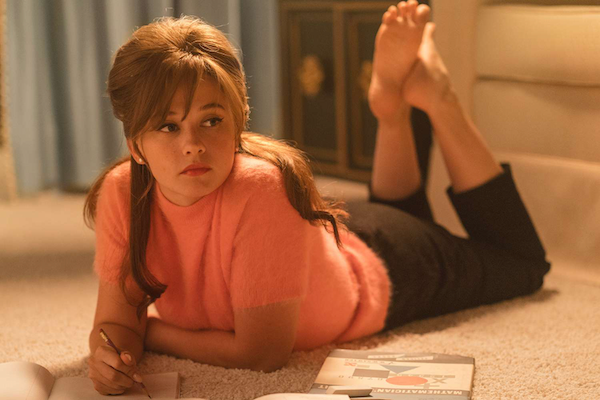Movie review by Greg Carlson
Several reports discussing behind-the-scenes communications and differences of opinion between Priscilla Presley (credited as one of the new film’s executive producers), the late Lisa Marie Presley (who died in January), and others with financial and personal interests in the legacy of Elvis add a fascinating intertextual layer to Sofia Coppola’s “Priscilla.” The movie’s title and the director’s filmography should offer strong indications of the principal narrative concerns; based on Priscilla Presley’s 1985 memoir “Elvis and Me,” the point-of-view belongs to the woman who would eventually marry and divorce the King of Rock and Roll.
Coppola’s own personal experiences with the pitfalls, privileges, and alienations of life in the spotlight have already informed several of her strongest movies, including “Lost in Translation” and “Somewhere.” “Priscilla,” however, walks right to the edge of the celebrity abyss, asking viewers to experience the strange and impossible orbit of the superstar through the eyes of the naive teenager who was just 14 years old when she first met Elvis. The ten-year gap between the two is not presented as a significant barrier to the exploration of a romantic relationship, and Coppola notes the curious hesitancy of Elvis to have sexual intercourse before marriage as well as the willingness of Priscilla’s mother and stepfather to permit their child to “date” an adult.
Recently, Priscilla has used the “it was a different time then” line in defense of the courtship, which began in 1959 when Elvis was completing military service in Germany, but much of Coppola’s filmmaking depends on the otherworldliness of Priscilla’s status as a kind of collected object simultaneously admired and reviled by Elvis. The meticulous production design by Tamara Deverell, the art direction of Danny Haeberlin, the set decoration by Patricia Cuccia and the costuming of Stacey Battat combine with Philippe Le Sourd’s cinematography to render Graceland as Priscilla’s gilded prison during the long stretches when Elvis was off performing or shooting movies with Ann-Margret or Nancy Sinatra.
Coppola has always capitalized on strong musical knowledge and an ear for dead-on perfect soundtrack selections. “Priscilla,” with assists from guru Randall Poster, Phoenix, and Sons of Raphael, eschews Elvis recordings in favor of the filmmaker’s previous tactic implementing anachronistic needle-drops that manage to convey the emotions of a moment with pinpoint precision. The time distance is not as great as the span between New Order/Siouxsie/Bow Wow Wow and the doomed queen in “Marie Antoinette,” but I loved hearing the Ramones, Dan Deacon, and Kaitlyn Aurelia Smith alongside selections from Brenda Lee and the Righteous Brothers.
Coppola uses her screenplay to confine and restrain the emotional eccentricity of the connection between Priscilla and Elvis. While Lisa Marie wrote prior to her death that the screenplay painted her father as “a predator and manipulative,” Coppola plays with contemporary attitudes on grooming, resisting urges to construct psychological explanations for the choices made by or for Elvis (Colonel Tom Parker only merits the tiniest corner of story real estate here). This approach intensifies the mystery of the recording artist as seen by Cailee Spaeny’s childlike Priscilla, and the towering, lanky, and occasionally somnolent Jacob Elordi is a stark contrast to the Elvis imagined by Austin Butler and Baz Luhrmann in the 2022 biopic.
Elordi may look giant-sized next to Spaeny, but his Elvis – without the benefit of familiar, potent tunes and on-stage performance charisma – is more human than many of the previous screen portrayals. Indeed, this is an Elvis whose comfort with sending a scout to procure young women aligns him with a sizable number of rockers yet to answer for their sexual predation. This is an Elvis whose reliance on pills, and willingness to push those pills on his teenage target, sees his long shadow shrink. In this woozy fairytale fantasy that will never be happily-ever-after, Coppola suggests we sit with some discomfort and rethink a few things.
